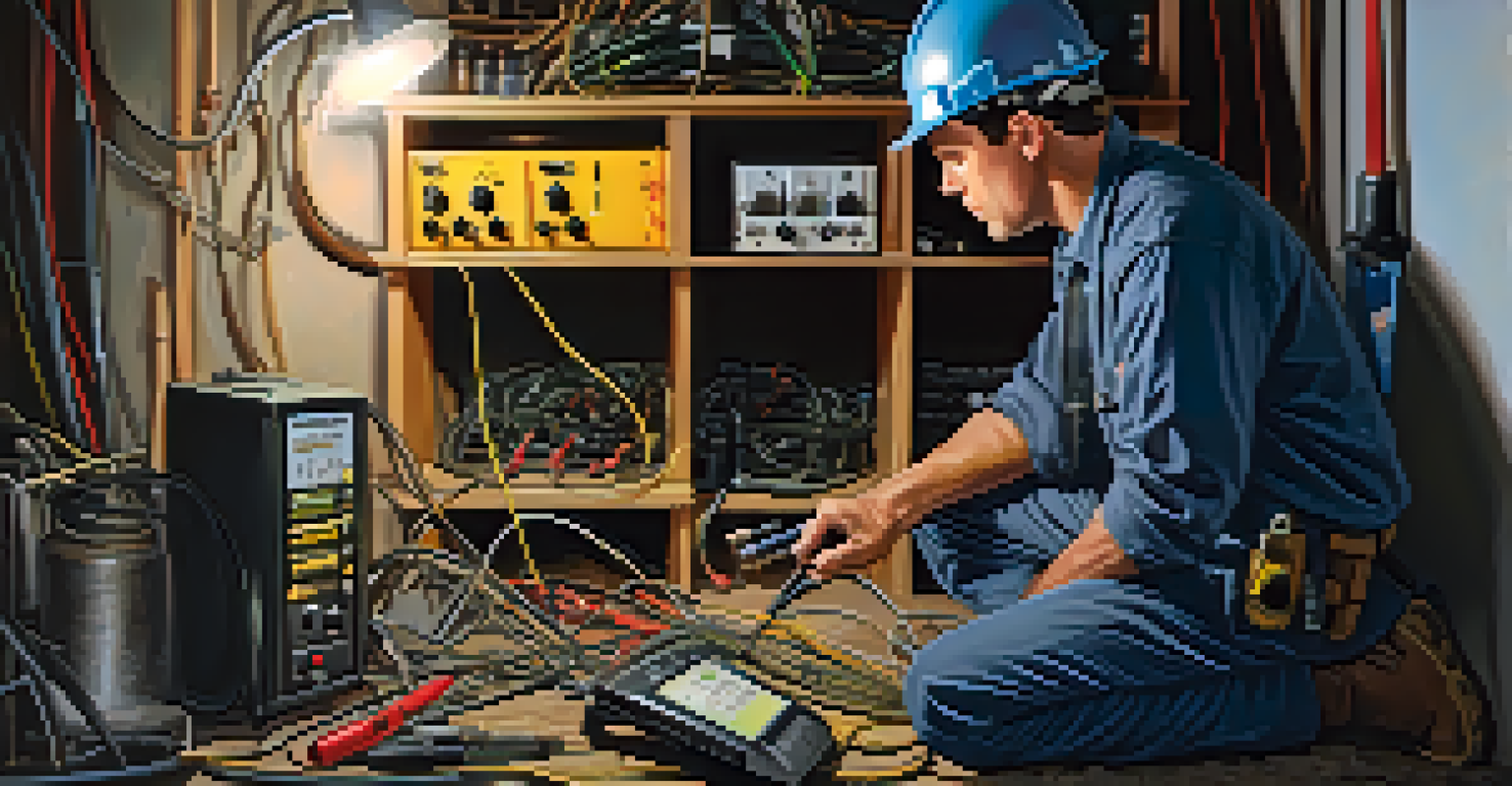Home Inspections: What Sellers Need to Know

Understanding the Importance of Home Inspections
Home inspections can be a pivotal step in the selling process, as they give potential buyers a snapshot of the property's condition. A thorough inspection can help identify issues that might deter buyers or lead to lower offers. Sellers who understand the inspection process can not only prepare their homes but can also enhance their negotiating position.
An ounce of prevention is worth a pound of cure.
When buyers see that a home has been well-maintained and any issues have been addressed, they often feel more confident in their purchase. This can lead to smoother transactions and potentially higher sale prices. For many sellers, understanding this importance can be the difference between a quick sale and a prolonged market stay.
Additionally, being proactive about home inspections allows sellers to have control over the narrative. By addressing problems ahead of time, sellers can avoid surprises and present their homes in the best light possible. This proactive approach can also lead to greater buyer satisfaction.
Preparing Your Home for a Successful Inspection
Preparation is key when it comes to home inspections. Start by decluttering and cleaning your home thoroughly to create a welcoming environment. A tidy space not only makes a good impression but also allows inspectors to easily access areas that need to be evaluated, such as the attic or basement.

Next, consider addressing minor repairs before the inspection takes place. Fixing leaky faucets, squeaky doors, or peeling paint may seem trivial, but these small details can significantly impact a buyer's perception of your home's value. Buyers are more likely to overlook larger issues if they see that the home has been cared for.
Home Inspections Boost Buyer Confidence
A thorough home inspection helps sellers address issues upfront, enhancing buyer trust and potentially leading to quicker sales.
Finally, ensure that all utilities are functional and accessible. This means turning on the gas, electricity, and water, as well as making sure that pilot lights are lit. An inspector will need to test systems like heating and air conditioning, and having everything in working order creates a positive impression.
Common Issues Found During Home Inspections
Home inspections can reveal a range of common issues that sellers should be aware of. These often include roof damage, outdated electrical systems, plumbing leaks, and HVAC problems. Understanding these common pitfalls can help sellers take proactive measures to prevent them from becoming deal-breakers.
The time to repair the roof is when the sun is shining.
For instance, a roof in disrepair can be a significant concern for buyers, as it often leads to costly repairs or replacements. By having a roofing professional assess the condition before listing the home, sellers can either make repairs or adjust their asking price accordingly. Being transparent about the condition of the roof can also build trust with potential buyers.
Another frequent issue is outdated electrical systems that may not meet current safety codes. This can be particularly concerning for buyers with families. Addressing these updates before the inspection can lead to a smoother sale and help avoid last-minute negotiations that could jeopardize the deal.
The Role of the Home Inspector
Home inspectors play a crucial role in the real estate transaction process. They are trained professionals who assess the condition of a property and provide detailed reports on their findings. Their expertise helps buyers make informed decisions and can significantly influence the sale.
During the inspection, the inspector will evaluate various aspects of the home, including the structure, roof, plumbing, electrical systems, and more. They look for safety hazards, code violations, and maintenance issues. Sellers should be prepared to hear their feedback, which can sometimes be difficult to digest but is essential for a successful sale.
Preparation is Key for Inspections
Sellers should declutter, make minor repairs, and ensure utilities are functional to create a positive impression during the inspection.
It’s also worth noting that a home inspector's report can be a double-edged sword. While it can help identify necessary repairs, it can also highlight issues that could lead to buyer hesitation. Therefore, establishing a good rapport with the inspector and understanding their process can be beneficial to the seller.
What to Expect During the Inspection Process
The inspection process can feel daunting, but knowing what to expect can ease some of the stress. Typically, inspections last around two to three hours, during which buyers and agents may accompany the inspector. This is an opportunity for sellers to demonstrate transparency and answer any questions that arise.
During the inspection, the inspector will conduct a visual examination of the home, noting any potential issues. They might test appliances, check plumbing fixtures, and inspect the roof and foundation. Sellers should be prepared to step back and allow the inspector to do their job without interference.
After the inspection is complete, the inspector will provide a report detailing their findings. This document can serve as a valuable tool for both sellers and buyers, as it outlines the current condition of the home and any recommended repairs. Understanding this report can empower sellers to address concerns proactively.
How to Handle Inspection Findings
Once the inspection report is in hand, sellers need to decide how to respond to any findings. If the inspection uncovers minor issues, sellers might choose to address these repairs before closing or offer a credit to the buyer to cover the costs. This strategy can help keep the sale on track and maintain buyer interest.
For larger issues, sellers may face a more challenging decision. It could be beneficial to consult with contractors to get estimates on repairs and decide whether to make the fixes or adjust the sale price accordingly. Open communication with the buyer can also pave the way for negotiations that work for both parties.
Pre-Listing Inspections Save Time
Conducting a pre-listing inspection allows sellers to proactively address issues, fostering transparency and reducing future negotiation hurdles.
Ultimately, a seller’s response to inspection findings can influence the overall success of the sale. Being prepared for negotiations and having a plan can make the process smoother and less stressful. Transparency and willingness to work with the buyer can foster trust and lead to a successful transaction.
The Benefits of Pre-Listing Inspections
Conducting a pre-listing inspection can be incredibly beneficial for sellers looking to streamline the selling process. By having a professional inspection done before listing the home, sellers can identify and address issues ahead of time. This proactive approach can save time and prevent unexpected surprises later on.
A pre-listing inspection also provides sellers with a clearer understanding of their home’s condition, allowing them to price it competitively. Armed with knowledge, sellers can showcase their property’s strengths while addressing weaknesses. This transparency can foster buyer trust and confidence.

Moreover, a pre-listing inspection can reduce the risk of negotiations falling apart due to unexpected findings during the buyer's inspection. By being upfront about the property's condition, sellers can create a more positive experience for all parties involved, leading to quicker closings and happier buyers.